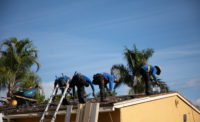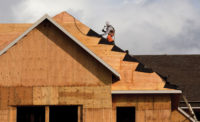Survey Data Shows Roofing Contractors Feeling Effect of COVID-19

While federal and state officials around the country focus on the rapidly-changing statistics to grasp the health and safety impact of COVID-19, measuring the pandemic’s sweeping economic effect is beginning to come into focus.
Millions of people are losing work as businesses shudder or have no choice but to cease operations due to shelter-in-place orders to combat the potentially-deadly virus’ spread. In the roofing and the construction trades, inconsistencies over "essential business" designations are on the mind of many business owners and employees alike.
RC and Clear Seas Research — the survey and research arm of RC’s parent company, BNP Media — reached out to professionals around the country from across several industries to collect their perspectives on the current crisis, and what to expect in the weeks ahead. The survey circulated the week of March 23.
Survey Highlights
The majority of respondents were contractors, primarily from the Midwest (32%) followed by the South (28%), West (21%) and Northeast (18%). The majority had up to 50 employees and generated less than $10 million annually, data showed.
When it came to health and safety, contractors were using email, text, and industry-focused communications apps to communicate with employees. The vast majority said they pushed general safety standards issued by the Occupational Safety and Health Administration (OSHA). Just over half (51%) said they were giving employees the option of working from home, and 39% said they required it. Another 44% indicated that they provided personal protection equipment (PPE) to staff.
Roughly 36% of respondents said they were delaying projects for employee safety.
Understanding that the pandemic is in its early stages in the United States, contractors also weighed in on anticipated workforce changes over next three months. Twenty-eight percent reported anticipating no change at all, while another 25% said they would likely have to layoff some workers. Another 21% said they’d temporarily suspend employees with pay.
When it came to dealing with customers and changing up marketing strategies, the majority said they were still using traditional methods. Phone conversations accounted for the highest contact point (67%), followed by email marketing (51%) and social media (36%). About 40% said they were changing their ads to communicate current availability and 38% said they were promoting proactive steps taken to protect the health and safety of employees and customers alike.
NRCA’s Survey Data
The National Roofing Contractors Association (NRCA) also conducted its own member survey during roughly the same time period and shared the results in its COVID-19 resource website.
Nearly half of all contractors (44%) said they were seeing a significant effect on business and that it was steadily increasing. Another 34% said it was noticeable, but not significant.
Nearly 60% indicated a slowdown in normal bid activity, while 45% said they experienced job cancellations. Those two responses, along with several other factors, led to 43% of respondents to note they’re already facing financial difficulties due to COVID-19.
While those numbers identify some universal concerns, not all the news was bad. Roughly 78% of respondents said they were not experiencing difficulties with material delivery or availability. Mark Graham, the NRCA’s vice president of technical services, said the demand for roofing and requests for technical assistance at his office has not tapered off much at all.
“The point to be made here is that the roofing industry is functioning surprisingly well,” he said on the NRCA’s first-ever Telephone Town Hall event earlier this week. “Designers are designing jobs and bidding jobs, manufacturers are making and shipping materials, and distributors are handling materials and contractors, for the most part, are installing materials.”
The optimism also came through in the survey results. More than 37% they were very confident in the future of their business, and a majority (56%) said they were somewhat confident. Just 6% were not at all confident. More respondents (61%) indicated their business could rebound within 30 days from when the epidemic ends. Another 28% said it could rebound within one to three months.
The information contained within this article comes from: Clear Seas Research. Download a copy of this report for free at www.clearseasresearch.com.
Clear Seas Research is a full service, B-to-B market research company focused on making the complex clear. Custom research solutions include brand positioning, new product development, customer experiences and marketing effectiveness solutions. Clear Seas offers a broad portfolio of primary, syndicated research reports and powers the leading B-to-B panel for corporate researchers, myCLEARopinion Panel, in the architecture, engineering, construction, food, beverage, manufacturing, packaging and security industries. Learn more at clearseasresearch.com.
Looking for a reprint of this article?
From high-res PDFs to custom plaques, order your copy today!







